What time is Virgin Orbit launch from Cornwall? How can I watch on live stream?
>
The countdown is on to the first ever orbital space launch on UK soil, with the county of Cornwall just hours away from ushering in a defining moment for the British space industry.
A former Virgin passenger plane is scheduled to take off from Newquay Airport tonight, before heading out to the Atlantic and dropping a rocket that will fly nine satellites into space.
It will see the UK officially enter the space race and comes more than 70 years after the British Space Programme was established in 1952.
So what time is the Virgin Orbit launch, what are Sir Richard Branson and co looking to achieve on this galactic mission, and how can you watch the iconic moment? MailOnline has all the answers.
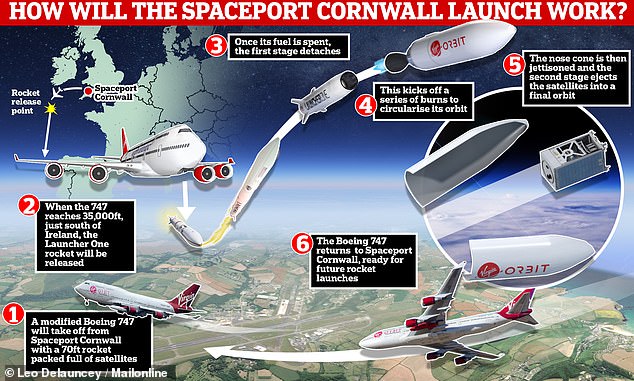
How will it work? History could be made as early as tonight (Monday), when Cornwall could host the first ever orbital space launch on UK soil. A former Virgin passenger plane is scheduled to take to the skies and drop a rocket that will fly off into space (shown above)
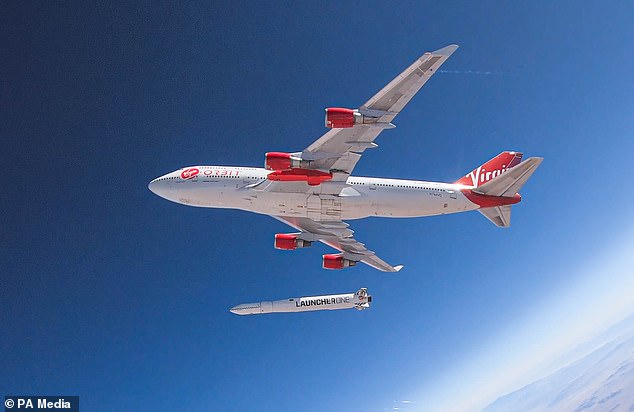

The mission, which will be the first commercial launch from Europe and the first international launch by Virgin Orbit, has been named Start Me Up in tribute to the iconic British band, the Rolling Stones
What time is the launch?
A repurposed 747 jumbo jet – named Cosmic Girl by Virgin – is expected to take off sometime between 21:45 and 22:45 GMT, after all the commercial flights at Newquay Airport have ended.
It will head out to the Atlantic Ocean, just south of Ireland, before releasing a rocket packed full of satellites when it reaches 35,000 ft.
The LauncherOne rocket is set to be dropped between 22:54 and 23:54 and will make its ascent in the direction of Portugal.
Cosmic Girl will then return to Cornwall Spaceport between midnight and 01:00 GMT on Tuesday.
Although tonight is when the window for lift-off opens, Virgin Orbit has back-up launch dates on January 13, 15, 18, 19 and 20.
This is just in case weather, or any technical gremlins, thwart the current plan.
Is there a live stream?
There is! All tickets for the viewing area at Newquay Airport were snapped up shortly after they became available, while many more people living nearby are expected to turn out to see the launch.
The rocket can even be spotted from across the UK when it is ignited.
But what if you want to watch the whole launch in full? Well, the good news is that you can, because a live stream will be available on Virgin Orbit’s YouTube channel.
Viewers can tune in via the company’s website here.
So can I actually see the rocket in the night sky?
Virgin Orbit says it should be possible for most people in the UK and Ireland to see LauncherOne within 60 seconds of ignition, while those living on the coast of France, Portugal, and Spain will get a good view within two to three minutes.
The company has released maps that show the route of the rocket and the timings for when people across Britain and beyond might be able to catch a glimpse of it in the sky.
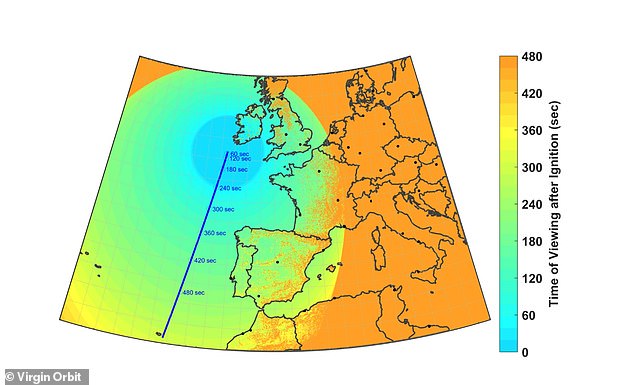

Virgin Orbit has released maps that show the route of the rocket (the blue line) and the timings for when people across Britain and beyond might be able to catch a glimpse of it in the sky
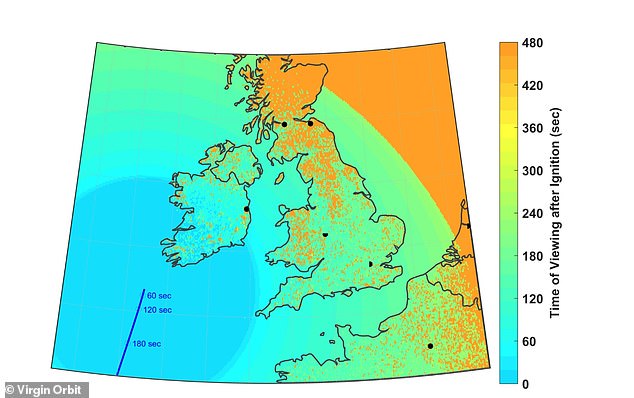

The company says it should be possible for most people in the UK and Ireland to see LauncherOne within 60 seconds of ignition, while those living on the coast of France, Portugal, and Spain will get a good view within two to three minutes
What is Sir Richard Branson looking to achieve with the mission?
Spaceport Cornwall’s development is expected to create around 150 jobs and allow the UK to compete in the global market for deploying small satellites into Earth orbit — an industry expected to be worth £3.9 billion by 2030 which Branson is hoping to tap into.
He also has Virgin Galactic, which is based in the US and focused on space tourism. In 2021, Branson flew to the edge of space and back in his Virgin Galactic rocket plane — beating Amazon founder Jeff Bezos and Space X’s Elon Musk in the billionaire space race.
Dan Hart, Virgin Orbit CEO, has also previously told MailOnline that human spaceflight was ‘not currently part of the company’s plans’ for the Newquay facility.
But he said Spaceport Cornwall could be used to send probes to Mars, Venus and the moon within the next three or four years.
‘Lunar missions and smaller craft bound for Venus and Mars could be launched [from Spaceport Cornwall] within the next three or four years,’ he said.
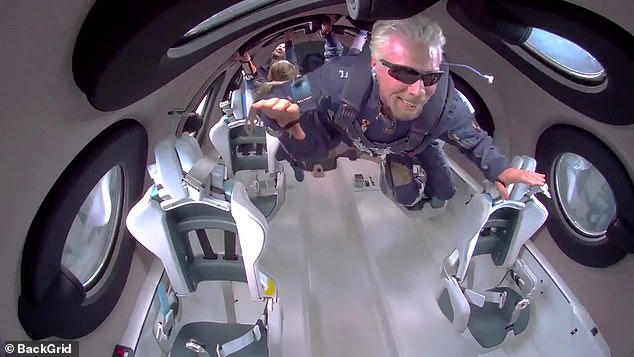

In 2021, Sir Richard Branson flew to the edge of space in his Virgin Galactic rocket plane — beating Amazon founder Jeff Bezos and Space X’s Elon Musk in the billionaire space race
‘We’re not going to launch a Perseverance rover (currently being used by NASA to search for signs of ancient life on Mars ), for example, but smaller interplanetary probes that explore or carry out landing missions are a possibility.’
How does LauncherOne work?
The upcoming Cornwall launch will involve Virgin Orbit’s carrier aircraft, a modified Boeing 747 called Cosmic Girl, and LauncherOne, a two-stage orbital launch vehicle tucked into Cosmic Girl’s belly.
Once Cosmic Girl is at a high enough altitude – around 35,000 feet – LauncherOne is unleashed.
It is angled skyward about 27° at the moment of release and freefalls for 4 seconds before the first stage engine accelerates the rocket to 8,000 miles per hour.
Once its fuel is spent, the first stage detaches. LauncherOne will be between 310 to 745 miles above the Earth when its second engine engages, kicking off a series of burns to circularise its orbit.
As it reaches space, a hatch then pops open to expose the payload of satellites, before the nose cone is jettisoned and the second stage ejects the satellites into low-Earth orbit.
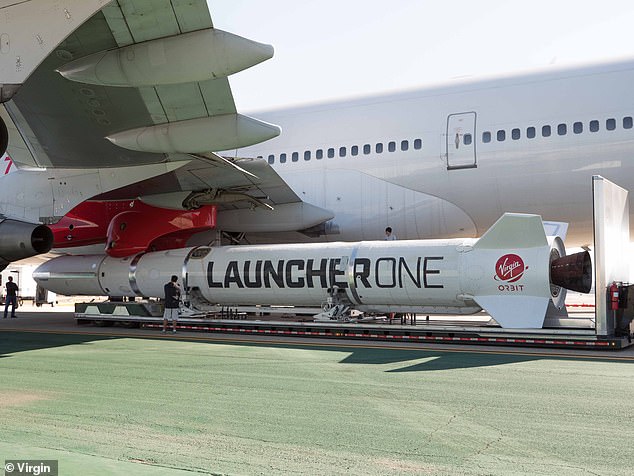

The Virgin Orbit Launcher One rocket will be equipped with Ministry of Defence observation kit among other payloads
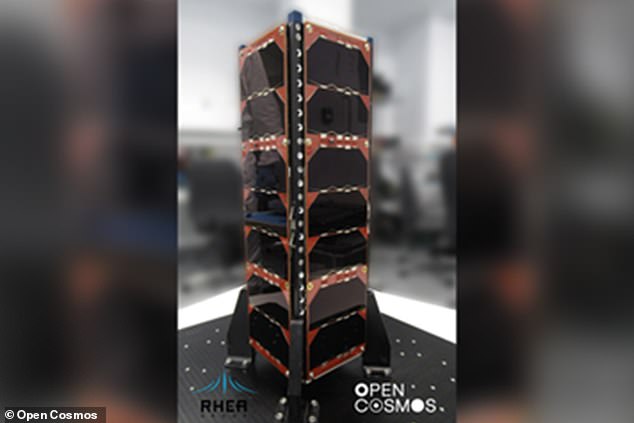

Several of the satellites being launched have been built in the UK, including a research satellite from RHEA Group (pictured), which was built by Open Cosmos in Oxfordshire
What satellites are being carried by the rocket?
Virgin Orbit will send two UK governments cubesats – measuring about 12 inches long, 8 inches wide and 4 inches deep – into space along with eight other payloads as part of a mission named Prometheus-2.
Built by In-Space Missions Ltd, based in Hampshire, and designed with Airbus Defence and Space, Prometheus-2 is a collaboration between MoD and international partners, including the US National Reconnaissance Office (NRO).
A number of the satellites are doing research and development (R&D), proving technologies for use on later operational spacecraft.
The cereal box-sized Cubesat 1′ and ‘Cubesat 2’ spacecraft will test new equipment to image the Earth, as well as new types of radio.
They will be able to monitor the transmission environment and could one day be used to detect the communications of smugglers or illegal fishers at sea.
Has Britain ever launched a rocket before?
Well technically, but it was 50 years ago. And it didn’t happen in the UK.
In 1971, a British-made rocket called Black Arrow reached space after blasting off from Australia.
Developed during the 1960s, the satellite carrier was used for four launches between 1969 and 1971, but it was its final flight which was the first and only successful orbital launch conducted by the UK.
The first and third failed, while the second was a suborbital test. No UK built rocket has been launched to space since, and never has one blasted off from British soil.
That is despite the fact that Britain is known for its expertise in manufacturing satellites.
Until now, the country lacked a way of getting its own hardware into space, but Virgin Orbit’s Spaceport Cornwall could provide a massive jolt in the arm to the UK’s satellite sector.
Where does the UK rank when compared to other space-faring nations?
The Soviet Union was the first nation to carry out a successful space launch, with Sputnik 1 in October 1957, before the United States, Japan, France, China, India, Israel and Iran all followed.
North Korea achieved the feat in 2012, along with South Korea earlier this year, so Britain would be the 11th nation to carry out a space launch on its own soil.
Is Britain, and more specifically Cornwall, a good place to launch a rocket?
Ian Jones, CEO of Goonhilly Earth Station, explains why Cornwall is the perfect place for the UK’s first orbital space launch, and for further lift-offs in the future.
‘We’re on a peninsula, surrounded by the ocean with the ability to get into, and communicate, with space,’ he said.
‘It’s like living on our own little spaceship here. It’s also the sort of environment that makes our services exportable to the rest of the world.’
The south-west coast of the UK is also reasonably well situated for launches into polar or low-earth orbit, although the weather obviously isn’t ideal.
Launch controllers don’t have to worry about hurricanes like they do at Cape Canaveral in Florida, but for Cornwall and the other spaceports coming online in Scotland in 2023, it could spring up some issues.
The good thing about Cornwall’s site, however, is that because it carries out horizontal launches, these are not impacted as much by adverse weather as vertical ones are.
How will the county benefit from the launch site?
Spaceport Cornwall’s development is expected to create around 150 jobs and allow the UK to compete in the global market for deploying small satellites into Earth orbit — an industry expected to be worth £3.9 billion by 2030 which Branson is hoping to tap into.
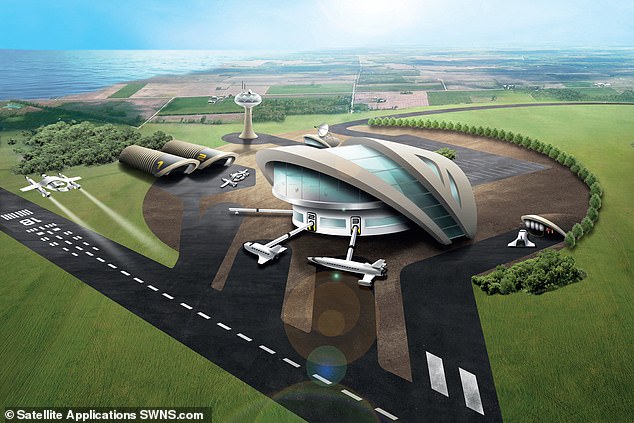

Spaceport Cornwall (pictured in an artist’s impression) will be the first such hub in the UK to enter service when the repurposed Newquay Airport hosts the space plane lift-off at night, after all the commercial flights have ended
Sam O’Dwyer, managing Director of Cornwall Airport Newquay, said: ‘We are incredibly proud to be involved in this innovative project to enable space launch from Cornwall Airport Newquay with Spaceport Cornwall and Virgin Orbit.
‘The team effort that has gone into developing a fully licensed Spaceport facility which will deliver safe and secure space operations for the UK’s first ever space launch has been simply inspiring and I’d like to say a massive well done to my team.’
What’s next for Spaceport Cornwall?
The site is targeting two unmanned commercial space flights a year from this year, but has a licence for up to 12.
Virgin Orbit, which has performed three commercial flights in the US, wants Cornwall to be its first base outside America.
If you enjoyed this article…
What other space launches will take place in 2023? MailOnline looks at the exciting missions blasting off this year
Why haven’t aliens contacted Earth yet? Scientists say it’s because there’s no sign of intelligence here!
Stargazers will have a once-in-a-generation chance to see a new comet at the end of January
